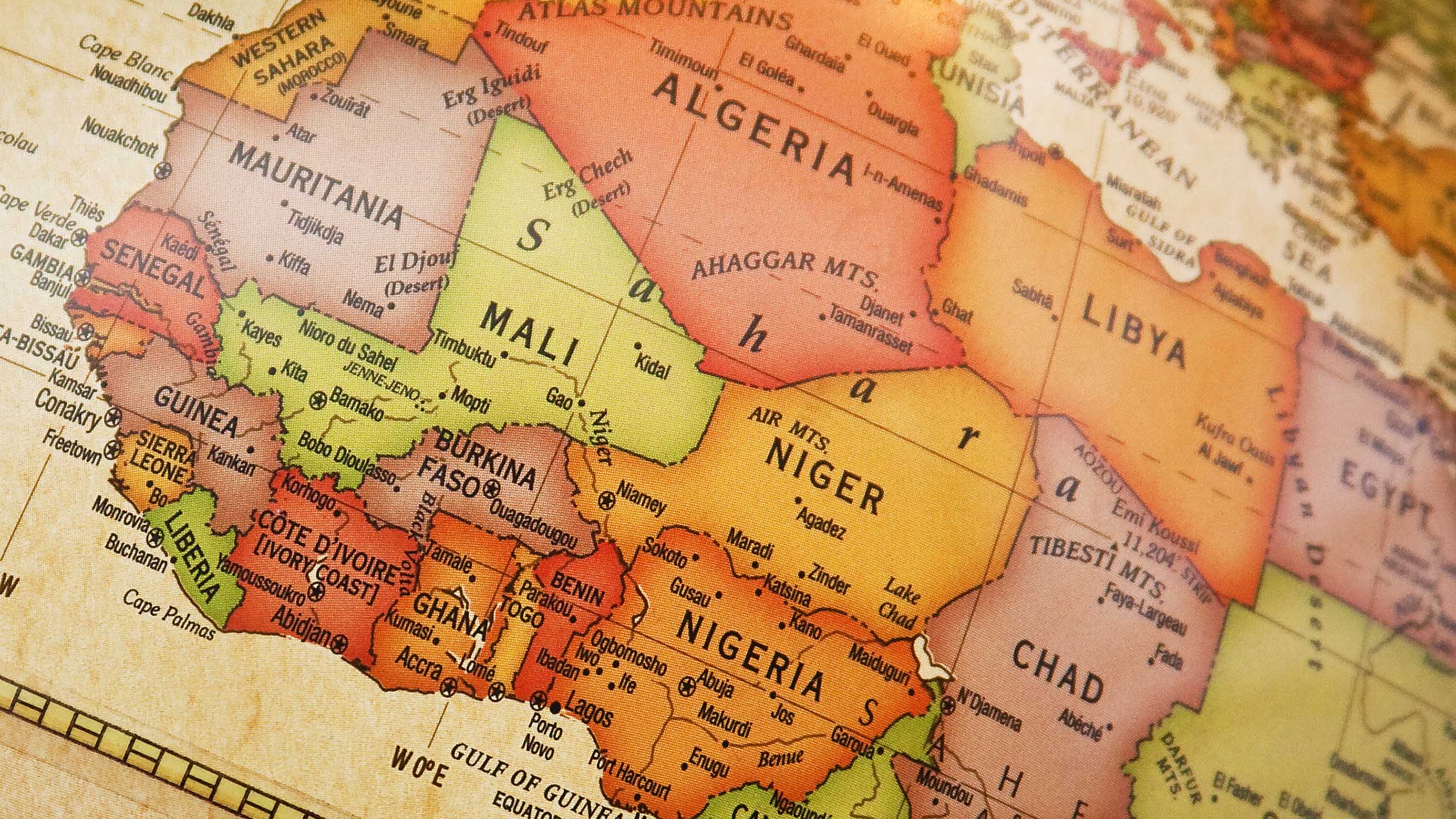Africa’s Nursery for Einsteins
In 1977, an 18-year-old volunteer teacher at a primary school in the African kingdom of Lesotho asked his math pupils to go outside and measure the height of the outside wall of the building. As they industriously walked rulers up the brick edifice, one particularly small boy was not following suit.
The young teacher, Neil Turok, went up to the boy and inquired about what he was doing. “He had simply measured a single brick there,” Turok recalled, “[and then] counted all the bricks on the wall and multiplied.”
The boy went on to show an intuitive talent with boundless potential for intellectual growth. But Turok, a native of South Africa who later become a Cambridge cosmologist and now directs the Perimeter Institute for Theoretical Physics in Canada, knew that even if his pupil survived into adulthood, the best possible future he could aspire to was limited — likely as a clerical worker at a South African mine.
The memory of that boy became the inspiration for the African Institute for Mathematical Sciences, or AIMS, an organization founded by Turok over a decade ago in a dilapidated hotel in the Cape Town suburb of Muizenberg. Since then, the institute has established additional small centers for advanced postgraduate education in Senegal, Cameroon, Tanzania, Ghana, and most recently Rwanda, with plans to have 15 centers across Africa by 2023.
And now AIMS has an even more ambitious goal: to find an African Einstein.
This spring, in Dakar, Senegal, the organization hosted one of Africa’s largest science conferences ever, with almost 1,000 scientists, development experts, and politicians, including two presidents. It was called the Next Einstein Forum.
The immodest name was no mere catchphrase. While Turok acknowledges that Africa has to catch up on existing science and research, he says to do so, it must aim high. The continent should focus on finding and developing pioneering geniuses in fundamental physics — literally the next Einsteins — and leapfrog to parity in quantum technologies, Turok says.
In a 2013 TEDx presentation, Turok shared his vision for finding the ‘Next Einstein’ in Africa.
“I would claim,” Turok said in a 2013 TEDx talk that telegraphed his ambitions, “that the best possible thing that could happen is if next great discovery of the human mind on the scale of Einstein’s — a discovery which tells us about the basic nature of reality and changes the future, and creates the future — if that next discovery is made by an African.”
The idea is gaining powerful backers. In March, the American Institute of Physics announced that Turok would receive its John Torrence Tate Award for International Leadership in Physics, partly for his work in building Africa’s nursery for genius. And President Paul Kagame of Rwanda has committed to partnering with AIMS on a major quantum science research center in Kigali, called Quantum Leap Africa. The country’s new AIMS center will welcome its first class of students at the end of August.
Turok, 57, readily admits that the goal of creating iconic theorists in the world’s most under-resourced and poorly educated continent is wildly unorthodox. “When I talk about the next Einstein coming from Africa,” he says, “I would naturally expect my physics colleagues to say ‘You’re mad.’”
But he also says he hasn’t gotten any pushback and that people are generally supportive. Turok believes that efforts to achieve African breakthroughs in fundamental science will, in turn, reinforce efforts to develop new commercial technology platforms and lucrative collaborations with Western peers. He also suggests that it will help counteract negative stereotypes of Africans and lead to a generation of graduates with mathematically based problem-solving skills — perhaps even reversing the brain drain from Africa.
When speaking about the motivation Africans have for learning, Turok and AIMS’s president and CEO, Thierry Zomahoun, point out that a generation of Jewish scientists transformed their fields in the late 19th century, when — after having been previously excluded — they suddenly gained admission, en masse, to European universities.
“This time around, when African cultures are allowed access to high-end science and research, it’s going to be far greater even than the fantastic contribution of Jewish students to science and humanity,” Zomahoun says. “Because we are now talking about one billion people who will soon represent 40 percent of all young minds in the world.”
Emmanuel Osalusi was one of seven children who grew up in a remote village in western Nigeria. He longed to be a chemist, and switched to math only because his parents could not afford $2 for the pipettes and other equipment he needed to study basic chemistry.
“I realized that math is cheap,” says Osalusi, now 45, with an ironic chuckle. “You have to buy nothing and people like Pythagoras have already done the hard work.”
Yet despite finishing at the top of his college math class in 1995, Osalusi would become a bus conductor in Port Harcourt. When he used geometry to solve a problem in his next job — a modest role within Nigeria’s oil industry — he was told, “You’re brilliant — you need to go back to school.”
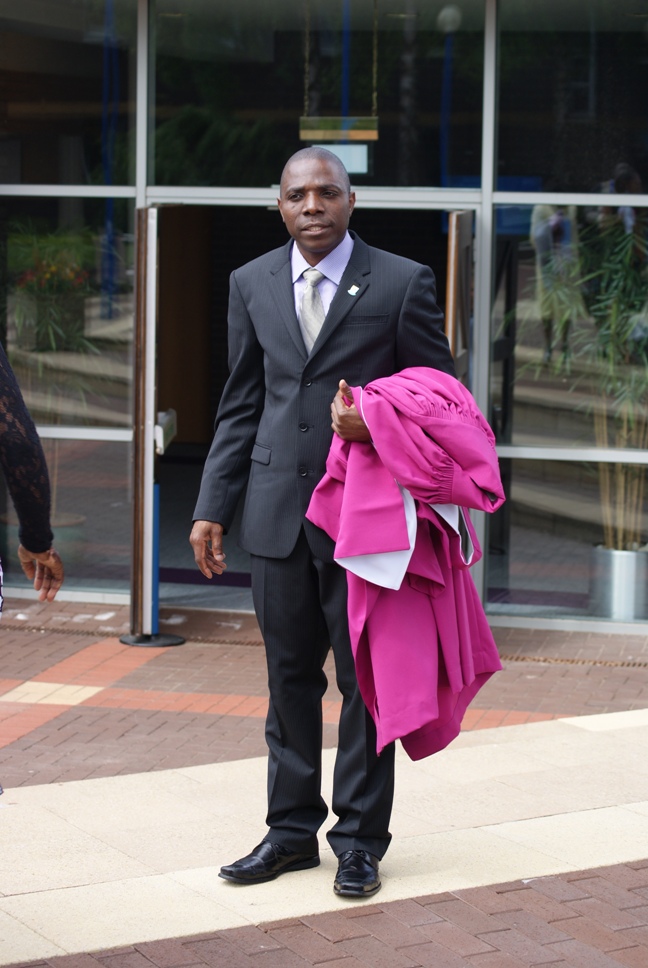
One day, a mentor pushed a flier under Emmanuel Osalusi’s door. It was about a scholarship in South Africa.
Visual: African Institute for Mathematical Sciences
It was far from an easy decision. “If you have a paying job in Nigeria, it is difficult to say, ‘I’ll go back to school,’ because you’re not sure if you’ll go back to a job,” he says. “But I sold my property and sold my car, and studied fluid mechanics,” hoping to land a job in the country’s booming oil industry. One day “a mentor pushed a flier under my door — it was about a scholarship in South Africa.”
Osalusi became one of AIMS’s pioneer students and graduated with the class of 2003. It was rough going at first: He says that Turok himself caught him cutting his cosmology class, which he would flunk, preferring to spend the time on fluid mechanics. But Turok knew better than to scold his student. “He understood,” Osalusi says. “Neil and his counterparts shaped my destiny.”
Now the holder of a doctorate in petroleum engineering, Osalusi, a father of two living in Lagos, is the senior meteorology and oceanography engineer for Shell Nigeria Exploration. There, he is charged with modeling ocean currents and turbulence in Africa, and can predict when and where oil spills will affect coastal communities and backtrack to identify the site of oil leaks.
“I am no Einstein,” he says with a laugh, about his mentor’s goal of cultivating geniuses. “But the physics of turbulence is poorly understood. Who knows, perhaps in the future I can discover something fundamental for science! AIMS is trying to make Africa great, and I think Kagame is right to invest in that.”
For his part, Neil Turok grew up poor after both his parents had been jailed for opposing the apartheid government in South Africa and came to Tanzania as refugees. Enthralled by the potential for “truly powerful mathematics” to solve problems, he obtained his doctorate from Imperial College, London, and then served as a theoretical science researcher at Fermilab in Chicago.
Despite his years in England and Canada, he still has that African habit of punctuating every big statement with a dry chuckle — a courteous impulse to defuse the drama for the listener.
And he makes a lot of big statements. During an interview with me at his office in Cambridge, England in 2006, he revealed that he had just made the mother of all bets with the scientist in the next office: a wager over the true origin of everything. “Would you like to meet him?” he asked mischievously.
That office belonged to the “Lucasian Chair of Mathematics,” and its modern occupant, Stephen Hawking, had collaborated closely with Turok in developing “open inflation” models of the Big Bang. Together, they had discovered the Hawking-Turok instanton solutions, which mathematically describe “what banged.” Hawking had bet his friend that long-frequency, primordial gravitational waves — stretch marks from a theorized, bizarre growth spurt in the early universe — would be discovered, confirming the standard inflation theory of the start of the universe.
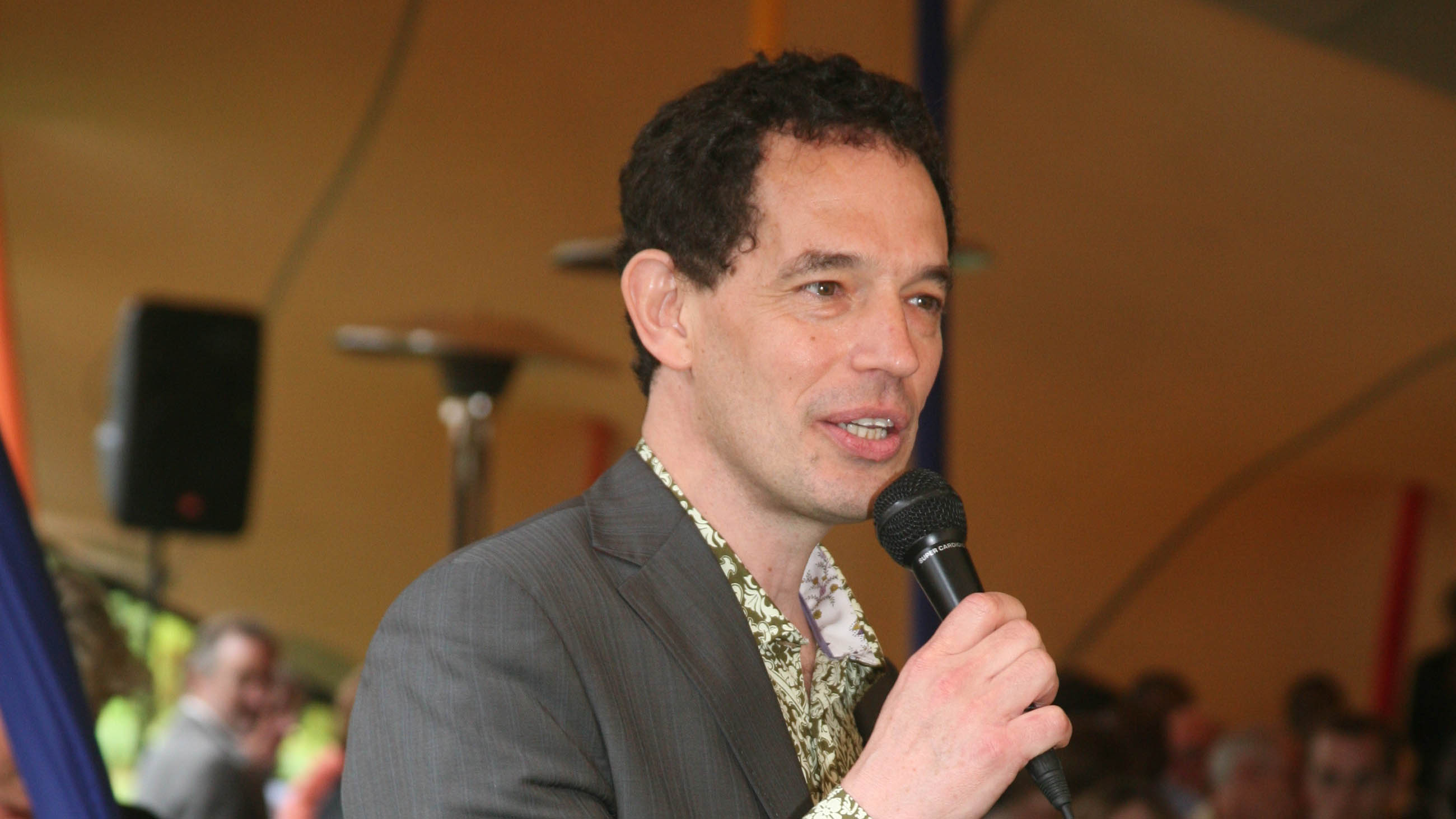
Turok bet that no such waves would ever be found, suggesting that the universe is far simpler “and more elegant” than projected, and possibly eternal. His own “cyclic” theory co-authored with the Princeton cosmologist Paul Steinhardt suggests that ours could be the child of a parent universe.
While short-frequency gravitational waves from colliding black holes were discovered this year — something that both Hawking and Turok expected — no such primordial waves have been detected to date. (Hawking claimed the bet in 2014 when researchers initially announced their discovery. But, to the consternation of inflation theorists, those same researchers were forced to acknowledge that their signal could have been caused by cosmic dust).
Turok says that so far, the cyclic theory has been consistent with both observational data and mathematics, but he’s still looking for simpler and more elegant ways to explain the universe.
“I’m looking for the right principle that will explain why the universe is so amazingly simple,” Turok says. “Our standard theories like inflation and string theory are largely failing to make serious predictions. This is the ideal moment for a new Einstein to come to the fore, and an opportune moment for all these richly talented cultures in Africa which have not been tapped. For the first time, young Africans are getting the sense that this is not beyond them and that their incredible talent is highly relevant.”
Thierry Zomahoun was destined for a street kid’s existence after being abandoned as a child in the small West African nation of Benin. His grandmother intervened, and raised the boy on a personal philosophy that equated education with freedom. Armed with an MBA from McGill University and a master’s in development studies from the University of Geneva, he worked a development strategist with the childhood empowerment agency Right to Play International before becoming AIMS’s director in 2011. His message about the world’s future reliance on African talent is popular, and he’s had great success in gaining support for the cause.
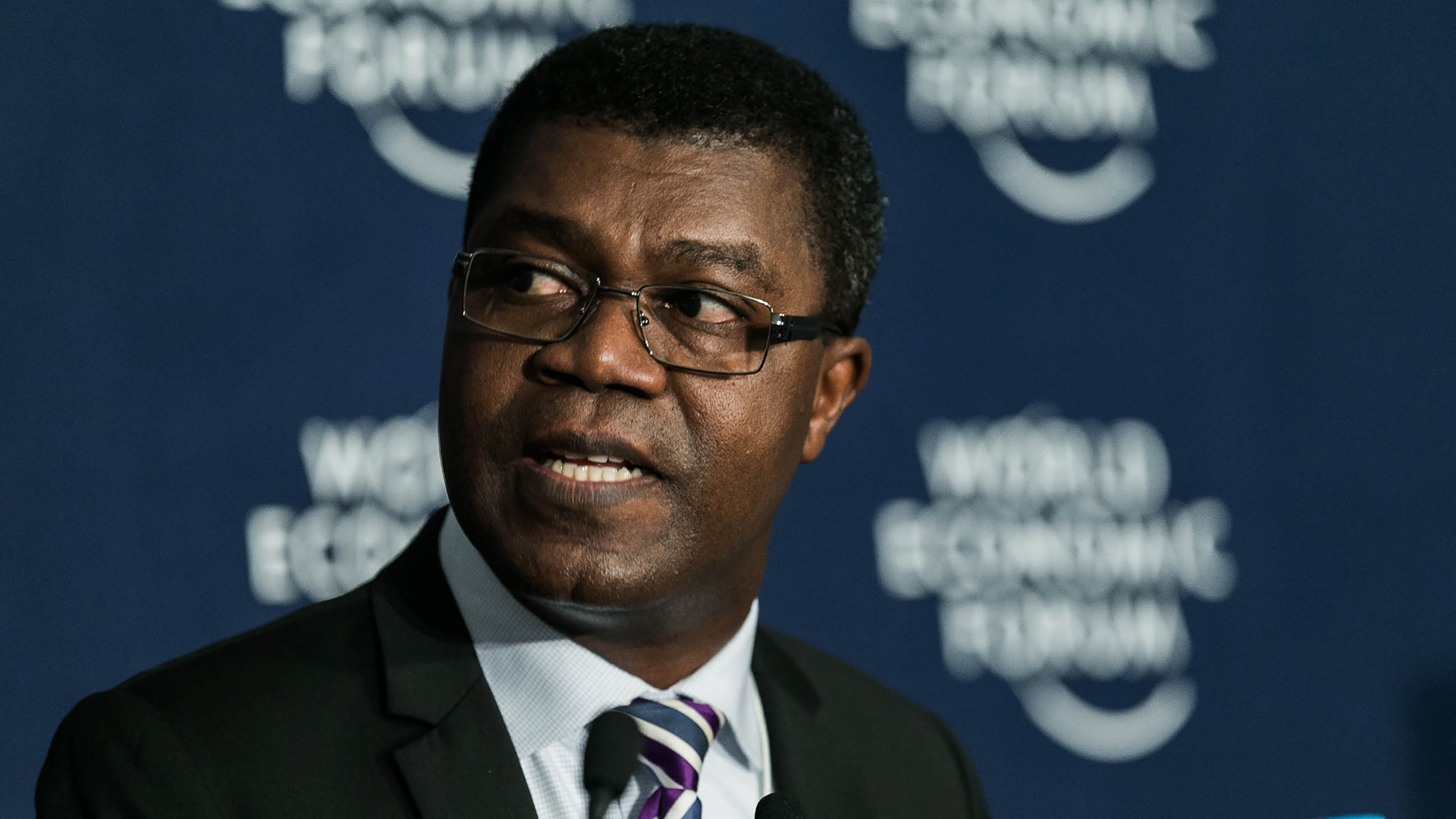
Last year, for instance, he and the AIMS team won a $25 million investment from the MasterCard Foundation for a major AIMS scholarship program. The institute already has major funding from the governments of Canada, Britain and others, as well as grants from foundations like Robert Bosch Stiftung.
And Rwanda, in addition to launching the quantum research center and new AIMS center, agreed to hold the 2018 Next Einstein Forum in Kigali, and even to house AIMS’s global headquarters.
Zomahoun says enlightened leaders like Rwanda’s President Kagame now fully accept that there is no longer a choice: Africa must compete at the highest level of the global knowledge economy or sink into catastrophic irrelevance. He argues that the international development model for Africa, which focuses overwhelmingly on primary school education, “has failed, and will continue to fail” a failure reflected in the fact that Sub-Saharan Africa produces only 1.4 percent of the world’s scientific knowledge, according to the United Nations and that its ratio of scientists stands at just 91 per million people, compared to 3,900 per million in the US.
“Africa cannot keep trying to catch up,” he says. “We have tried that for 50 years.” And because the continent will be home to 40 percent of all young minds by 2050, according to UNICEF, he calls it a “mathematical probability” that many leading scientists will be African as long as graduate-level institutions like AIMS are nourished and encouraged to spread.
Since its founding in 2003, AIMS has produced 1200 graduates from its centers in South Africa, Senegal, Cameroon, Tanzania, and Ghana. Turok says its educational philosophy is geared “to what scientists actually do” — creating problem solvers through a broad, math-based toolbox of skills. A 10-month, tuition-free master’s program costs AIMS one-fifth of what it costs its Western counterparts, according to Turok, with graduates then able to apply to doctoral programs elsewhere. Instructors typically share living quarters with students in an interactive, 24/7 learning environment and lecturers sometimes include visiting Nobel laureates and Fields Medal winners.
AIMS centers produced 85 peer reviewed articles from 2013 to 2014 and alumni have gone on to join research institutions including the Dublin Institute of Technology and Shahid Beheshti University in Tehran. More significant, 60 percent of alumni have remained in Africa.
So far, they have made their greatest impact in using advanced mathematical modeling to address public health crises. Dr Martial Mbah, from Cameroon, has mapped crucial links between under-researched diseases like schistosomiasis (bilharzia) and HIV/AIDS. He also worked with the Liberian government during the country’s Ebola epidemic to better understand the spread of the disease. Angelina Lutambi, from Tanzania, conducts similar cutting-edge research for that country’s Department of Health. Daphney Singo, a 2006 graduate from South Africa, is a nuclear physicist now developing novel gamma-ray tracking techniques at the iThemba Laboratory for Accelerator-Based Sciences. And Wilfred Ndifon, an NEF fellow, recently proposed a solution to a 70-year-old problem in immunology, developing a theoretical model that uses substances called adjuvants to better activate immune system cells to fight infection.
Zomahoun says the institute is committed to dramatically boosting its ratio of female graduates, who currently make up only about 30 percent, with “female Einsteins” being the ultimate aspiration. One of these alumnae, Hind Ahmed, a 2006 graduate from Sudan, says in her AIMS profile that the institute gave her a career focus that was previously missing. “Before I came to AIMS I only wished to pursue postgraduate studies in Physics and maybe do a Master’s. After AIMS, I got to know the person I want to be…AIMS helped me to shape my purpose in life.” Now she is a postdoctoral research fellow at Trinity College, Dublin, researching new luminescent materials to promote solar cell efficiency.
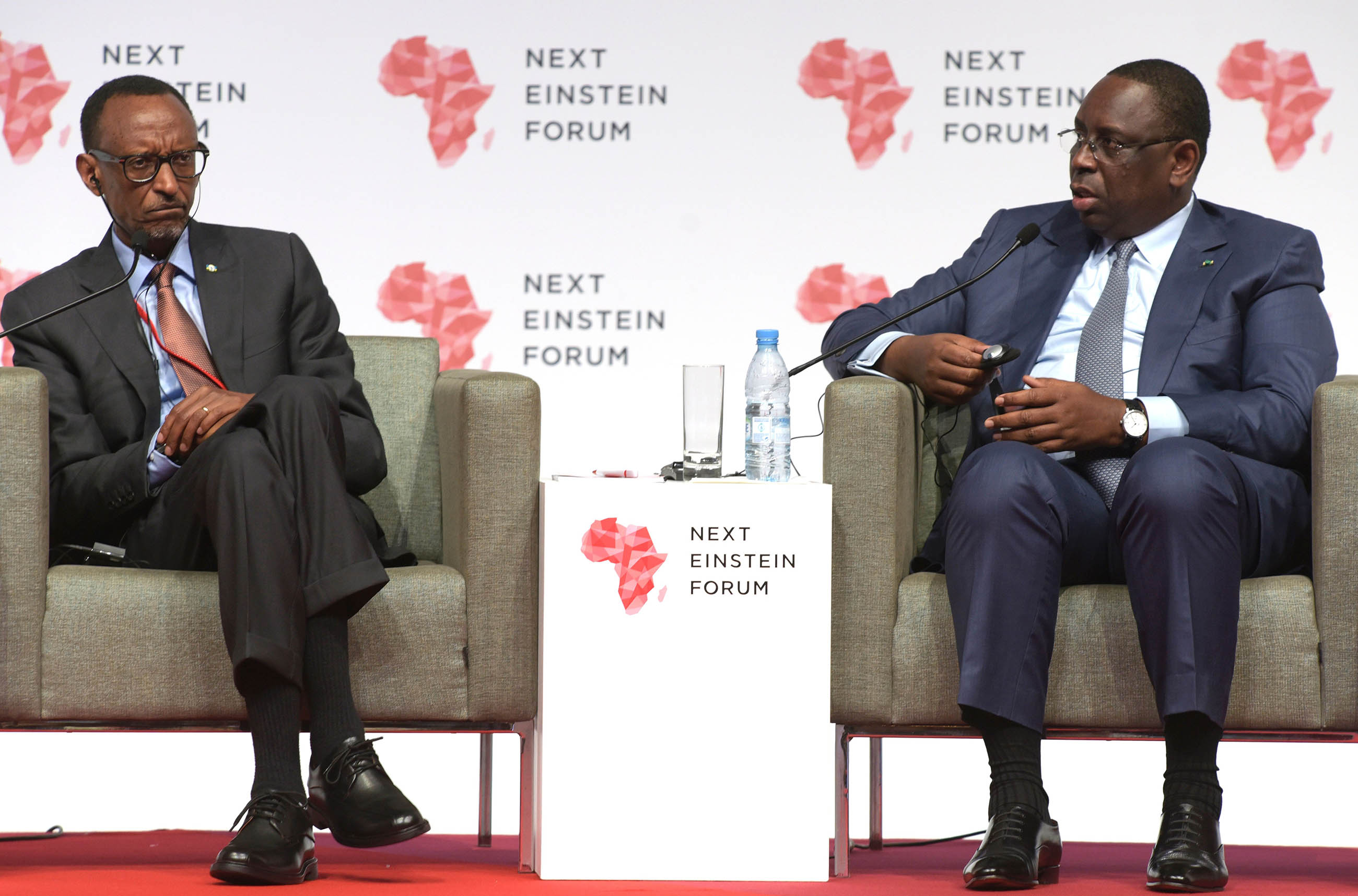
“AIMS is a very practical organization,” Turok says. “We do not want to create white elephants, so the training and research will be relevant.” The institute offers entrepreneurship courses, and a new program allows students to pursue internships at commercial companies after their 10-month academic programs.
For all of AIMS’s promise, Zomahoun acknowledges that many educators and development experts think Africa’s scientific future lies in more and better STEM education at the primary and secondary levels. Paul Wiegmann, a physicist at the University of Chicago and a leader in the theory of quantum systems and condensed-matter physics, says he doubts that AIMS, or any program, can deliberately produce disruptive geniuses on the scale of Einstein. “These events are rare in the history of mankind,” he says. “I do not think they can be planned or governed.”
Still, he has met with AIMS lecturers and students and thinks the institute’s model fills a critical gap left by the international development approach.
When Turok is asked whether he has witnessed a blooming of genius in Africa, his reply is tempered. “I have not been blown away so far,” he acknowledges. But then he quickly adds: “My standards are very high, and, if anything, I am more optimistic than ever.”
Rather, he says, he has been blown away by the intellectual ambition he has seen in Africa, among both students and politicians. “The timing of all this resonates very strongly with African leaders’ aspirations,” Turok says. “I can tell you that among everyone from students to policy makers, the word ‘quantum’ definitely grabs attention in Africa.”
Turok says people are well aware of the fact that the next tech revolution is likely to be quantum. While Africa has been marginalized from the physics frontiers, Next Einstein is about trying to make sure it’s “involved in fundamental physics on small scales and large scales, and especially quantum scales.”
Zomahoun suggests that African youth enjoy some cultural advantages over their Western counterparts. They tend to “think bigger,” he says, and religious practices in many African cultures actually tend to encourage science.
“From my own experience, religion across Africa has been more an enabler of science than a suppressor,” he says. But because of all the issues under the spotlight corruption, Boko Haram, poverty, disease he says people don’t think anything great will come from the continent.
The world may soon look to Africa for talent, and for solutions. “Maybe getting an African ‘quantum valley’ established might take three or five decades. What’s important is that we get started,” Zomahoun says.
Rowan Philp is a Boston-based freelance writer and Knight Science Journalism alum who previously served as chief reporter and international correspondent for The Sunday Times in South Africa. His foreign correspondence career has included a bureau chief role in London for the Times, and coverage of conflict, politics, and public health crises from more than two dozen countries.










